What's Happening?
Saudi Arabia is making significant strides in renewable energy, investing $8.3 billion in solar and wind projects. This move is part of a broader strategy to diversify its energy sources and reduce reliance on oil. The kingdom aims to generate half of its electricity from clean sources by 2030, positioning itself as a major supplier of critical minerals like lithium and copper. Meanwhile, the US, under President Trump's administration, is facing challenges in advancing renewable energy projects due to regulatory hurdles and reduced support for clean energy initiatives. This contrast highlights the differing approaches to energy policy between the US and other global players like China and Saudi Arabia, who are prioritizing renewable energy as a means to achieve economic and political strength.
Why It's Important?
Saudi Arabia's focus on renewable energy underscores a global shift towards sustainable energy solutions, which could have significant implications for the US. As other nations invest heavily in clean technologies, the US risks falling behind in the race for energy innovation and economic competitiveness. The Trump administration's regulatory stance on renewable energy projects may hinder the US's ability to capitalize on emerging markets and technologies. This could impact the country's economic growth and its position in global climate negotiations. The success of Saudi Arabia and China in renewable energy could serve as a wake-up call for US policymakers to reconsider their approach to energy policy and investment.
What's Next?
The US may need to reassess its energy strategy to remain competitive in the global market. This could involve revisiting regulatory policies and increasing support for renewable energy projects. As Saudi Arabia and China continue to advance their clean energy initiatives, the US may face pressure to align its policies with international trends and address climate change more aggressively. The political consensus on the benefits of renewable energy could drive bipartisan efforts to enhance the US's energy infrastructure and reduce dependence on fossil fuels.
Beyond the Headlines
The shift towards renewable energy in Saudi Arabia and China reflects broader geopolitical dynamics and the strategic importance of clean technologies. These developments highlight the potential for renewable energy to reshape global power structures and influence international relations. The US's response to these changes could determine its future role in global energy markets and its ability to lead in climate action. The evolving landscape presents opportunities for innovation and collaboration, as countries seek to balance economic growth with environmental sustainability.









